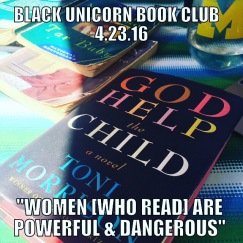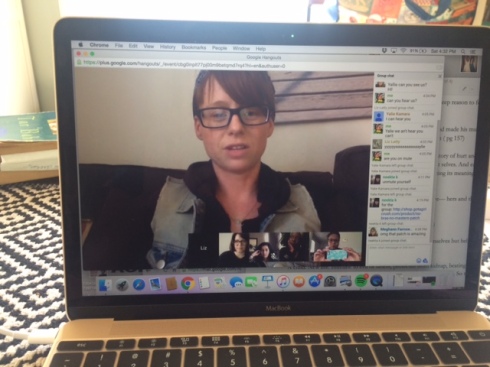 On April 23rd, 2016 the inaugural session of Black Unicorn Book Club (BUBC) virtually brought together seven women to discuss Toni Morrison’s most recent novel, God Help the Child. Participants joined from all over the country, including the San Francisco Bay Area, Baltimore, Indianapolis, and Brooklyn. I am based in Michigan and after a mild but still very gray and long winter, the sun was finally out, the trees were starting to bloom, and I was feelin’ myself in a new dress and a pop of raspberry red lipstick. I was so ready to talk about this book, to build community with a group of smart and brave women, and to of course sip on my blackberry basil bourbon cocktail in the sunshine.
On April 23rd, 2016 the inaugural session of Black Unicorn Book Club (BUBC) virtually brought together seven women to discuss Toni Morrison’s most recent novel, God Help the Child. Participants joined from all over the country, including the San Francisco Bay Area, Baltimore, Indianapolis, and Brooklyn. I am based in Michigan and after a mild but still very gray and long winter, the sun was finally out, the trees were starting to bloom, and I was feelin’ myself in a new dress and a pop of raspberry red lipstick. I was so ready to talk about this book, to build community with a group of smart and brave women, and to of course sip on my blackberry basil bourbon cocktail in the sunshine.
 But let’s back up. What’s is this virtual book club all about? And what exactly is a Black Unicorn? The Black Unicorn Book Club is a virtual club for women and trans-women who read as a means of self care and survival. Through curated, monthly discussions, BUBC participants engage with texts that are womanist, queer, people of color focused, brave, and unapologetically interested in the messiness of the human experience. The name of the club is inspired by the title poem and 1978 poetry collection The Black Unicorn by Audre Lorde. The poem reads:
But let’s back up. What’s is this virtual book club all about? And what exactly is a Black Unicorn? The Black Unicorn Book Club is a virtual club for women and trans-women who read as a means of self care and survival. Through curated, monthly discussions, BUBC participants engage with texts that are womanist, queer, people of color focused, brave, and unapologetically interested in the messiness of the human experience. The name of the club is inspired by the title poem and 1978 poetry collection The Black Unicorn by Audre Lorde. The poem reads:
The black unicorn is greedy.
The black unicorn is impatient.
The black unicorn was mistaken
for a shadow or symbol
and taken
through a cold country
where mist painted mockeries
of my fury.
It is not on her lap where the horn rests
but deep in her moonpit
growing.
The black unicorn is restless
the black unicorn is unrelenting
the black unicorn is not
free.
This poem and poetry collection is one of those text that feeds me—it’s a text I go back to again and again to feel seen and heard. It’s a survival text, a guide, a prayer, and a reminder that it is possible for the black unicorn— or black woman— to live free. For me a “black unicorn” is any woman who despite being mocked or “mistaken for a shadow or symbol” cannot be silenced. A black unicorn is a woman who is dedicated to living as her authentic self, no matter how many mirrors tell her she does not exist, a woman who is invested in laughing and learning, a woman who is disinterested in being a martyr or a mule, and who seeks ways to affirm and build with other women.
This last year has been a test of learning to affirm and love myself. Last summer I was married to a strong woman who is in all ways my equal, my light, and my home. We have spent the last eleven months building together as newlyweds, which has been beautiful but also meant we’ve done a ton of #ADULTING— budgeting, adopting a rescue dog, buying a car, learning to navigate in-laws— and some of this has also meant learning how to better prioritize our own mental health and self-care. For me, it’s meant going back to therapy to finally work on some of the unhealthy ways I’ve learned to hold my anxiety and childhood wounds. It’s also meant re-dedicating myself to my creative work as a writer and educator. The Black Unicorn Book Club is my latest project to connect with other women who are #ADULTING, dreaming, and making their lives happen, but more so women who are interested in healing through storytelling and literature.
Here’s the thing: books save me, every day. Trips to the library growing up were about escape and finding myself in the imaginations of writers. At first I found myself in the pages of the Sweet Valley High series and while I was physically nothing like the blue-eyed, blonde haired twins sisters Elizabeth and Jessica, I related to Elizabeth because she, like me, was bookish, logical, and often at odds with a family who was the exact opposite of her. As I grew as a reader, I found other writers —writers of color—and books that fed me. When I read The Bluest Eye my world split in two. My heart ached for Pecola and the abuse she endured, but also my heart raced because here, at last, was a girl who wanted blue eyes, a girl like me who struggled with loving herself in the face of white beauty standards. I felt seen, validated, and from here on I devoured any and every book by Toni Morrison, and found my way to others like Zora Neale Hurston, Alice Walker, and of course Audre Lorde— just to name a few.
“The black unicorn is restless,” and so am I. I am restless to find and discuss stories that attempt the real work of building empathy and human connection. I am restless in this body— I want to discuss, to write, to share so that my silence is not taken for granted. I want to build a house where women can own and explore the ways they’ve felt validated by literature. I want to see the works of people of color, queer, and womanist authors thrive and uplift these stories. As the brave author Lidia Yuknavitch writes, “Out of the sad, sack of shit that was my life, I made a word house.” This is my word house—The Black Unicorn Book Club, and on April 23rd we spent two hours discussing God Help the Child and its cycles of violence, the love story between Bride and Booker, and the harsh mother-love of Sweetness. It was affirming because instead of a little girl sitting alone in a corner with a dictionary, I sat face-to-face with seven powerful and courageous women and we made #Lemonade out of a story.
Here’s hoping some of you will join us for the upcoming summer sessions. We’re starting with Citizen: An American Lyric by Claudia Rankine on June 25. Onward, unicorns!

One thought on “Onward, Unicorns: Building a Word House & Making #Lemonade Out of Literature”